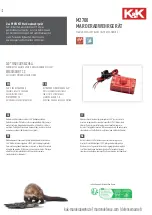
www.DaikinApplied.com 13
OM 752-4
State Programming
The MicroTech II UVC takes advantage of “state” machine programming to define and
control unit ventilator operation. A “State” defines a specific mode of operation for each
process within the unit ventilator (e.g., heating, cooling, etc.) and contains the specific
decision logic and sequence of operation for each mode. This eliminates some of the
most common problems associated with control sequences such as the possibility of
simultaneous heating and cooling, rapid cycling, etc.
The UVC states and super states are used to define the “normal” unit modes, such as
Off, Night Purge, Fan Only, Emergency Heat, Auto, Cool, Heat, and Active Dehum. The
UVC also sup ports several “special purpose” unit modes such as Purge, Pressurize,
De-pressurize, and Shut down, which can be forced via a network connection and over-
ride typical UVC operation.
The state diagrams presented in the following sections consist of several features
including super states, states, transition logic and methods of entry to the state. Super
states are used as a means to group two or more related states into a single control
function. There are three super states: Heating, Cooling and Emergency Heat. The
states, which are indicated by a specific state number, are where all the actual work
takes place. Within each state the UVC enables PI-loops and other logic sequences
required to control unit ventilator operation within that particular state, while other func-
tions and PI-loops not needed during that state may be disabled. The transition logic
represents questions used by the UVC to determine which state should be made ac-
tive. These transition questions are constantly being monitored by the UVC, which al-
lows the unit to switch between modes as it deems is necessary. The possible methods
of entry to each state or super state vary. Entry into some states must be forced by an
input through the LUI or a network input, some states will only be entered automatically
from a super state or other state, while some can be entered manually or automatically.
The arrangement, relationship and possible methods of transition of all states for this
version of UVC software is shown in Figure 6 on page
14.
Note:
Not all states or modes are available for all UV configurations, and some states (such as
Active Dehum) are optional.
d
esCrIptIon
of
o
peratIon
Summary of Contents for MicroTech II
Page 2: ......














































